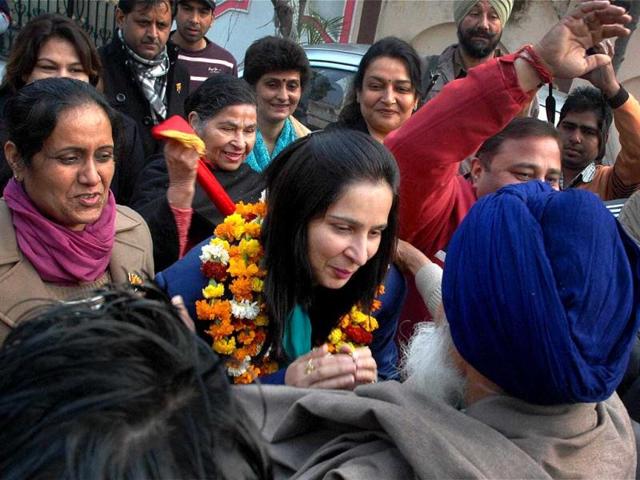Minister takes 'sting' out of Dr Sidhu's campaign
Her "under-cover" operations had stung former Punjab health minister Madan Mohan Mittal. But the reshuffle of cabinet berths among BJP ministers in September last year has health minister Surjit Kumar Jyani taking the "sting" out of chief parliamentary secretary (CPS) Navjot Kaur Sidhu's campaign.
Her "under-cover" operations had stung former Punjab health minister Madan Mohan Mittal. But the reshuffle of cabinet berths among BJP ministers in September last year has health minister Surjit Kumar Jyani taking the "sting" out of chief parliamentary secretary (CPS) Navjot Kaur Sidhu's campaign.

The CPS, who had defiantly locked horns with Mittal by carrying out sting operations on government doctors indulging in private practice, was made head of a panel to check the problem soon after Jyani took over the reins of the department.
At a meeting, the over-zealous minister also warned civil surgeons and senior medical officers (SMOs) that they would be held responsible if any government doctor was found doing private practice in their area. But Jyani stole Sidhu's thunder by entrusting his own "snooping squad" of confidants to carry out surprise checks and raids in government hospitals and health centres on availability of doctors and medicines and ensure cleanliness.
To avoid overlap in the "sting operations", state's 22 districts were divided into eight zones between the minister and the CPS, both getting four each. While the minister claims to be holding meetings in the zones under him, Sidhu is yet to do so. The panel headed by her -- it also comprises principal secretary health Vini Mahajan and three civil surgeons of Ludhiana, Nawanshahr and Patiala -- too has not met to suggest ways to prevent doctors from defying the health department's diktat on private practice.
Admitting that nearly 70% of doctors have been indulging in private practice along with the government job in the state, Jyani said he was awaiting the recommendations of Sidhu's panel. "We have made a committee under Sidhu to suggest ways of addressing the problem but have still to get its suggestions. The panel will also study models of other states to come up with a policy," he said. The department, he said, is against any drastic action as it could trigger resignations. "We are reeling under an acute shortage of doctors. Creating fear will only prompt threats of resignations by doctors."
But Sidhu, who had garnered publicity by openly daring Mittal to "show her the rules that debarred sting operations to nab errant doctors", is now saying "all's well".
"All those doctors who were indulging in private practice have resigned as they knew we would go after them. So there is no need for any sting operations. Only those committed to government service are with us," Sidhu said. On recommendations of the panel formed under her, she said she was holding regular meetings with civil surgeons and SMOs in districts.
Though she contends there has been a spurt in resignations, the health department denies it. Director health and family welfare, Dr Kiranjit Singh, when contacted, said, "In normal course too, doctors resign. The numbers in recent months are not higher than usual. We are still going after those who do private practice during work hours and are running their own nursing homes and hospitals."
The Punjab Civil Medical Services Association (PCMS) says the government is not serious about curbing the menace. "To deal with shortage of specialists, the way out is creating a sub-cadre of specialists as they fetch much higher salaries in the private sector. There is still ambiguity in the government policy on the number of years needed to become a specialist and no clear-cut rules have been defined," PCMS Association president Dr Gagandeep Shergill said.
After tough talk, the escape route
One of the proposals of the health department to check private practice by doctors is to set up "pay clinics" within government hospital premises. These specially-designed clinics will be equipped with better infrastructure and offer services at a higher price than government rates. The extra income would be shared between doctors and the government. "Pay clinics is one of the proposals under consideration as it will allow doctors to do private practice without violating service rules," director health and family welfare Dr Kiranjit Singh said.
Rubbishing the proposal, Dr Gagandeep Shergill of the PCMS Association said, "The government sector caters to the poor patients. There is a direct conflict of interest in government doctors doing private practice as they may call the same patients in the evening hours. Only doctors committed to government service should stay in it rather than destroying public hospitals by handing them for private practice."





